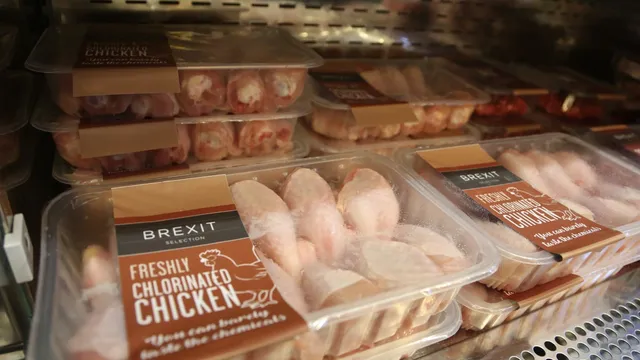
Nigel Farage supports the sale of chlorine-washed chicken in UK trade deal
2025-04-04 08:18- Nigel Farage supports the import of American chlorine-washed chicken in UK trade negotiations.
- Concerns exist regarding public health and food safety related to such practices.
- The British public largely opposes the import of chlorine-washed chicken, emphasizing a need for high food standards.
Express your sentiment!
Insights
In recent discussions concerning UK trade deals, particularly with the United States, Nigel Farage, the leader of Reform UK, expressed his willingness to allow the import and sale of American chlorine-washed chicken in Britain. This stance aligns with broader negotiations to enhance trade relationships post-Brexit, particularly in agricultural sectors. The use of chlorine-washing is controversial, as it involves treating poultry with chlorine to eliminate harmful bacteria such as Salmonella and E. coli. However, critics argue that this method can compromise food safety standards and enable poorer practices in animal husbandry. Additionally, recent reports indicate that a significant percentage of American chicken carries harmful bacteria, raising concerns about public health implications. Following this dialogue, public opinions have remained staunchly opposed to chlorine-washed chicken imports, with polling showing that as of 2020, an overwhelming 80 percent of the British population rejected the idea. The UK government has, at times, been cautious, as previous Prime Ministers, including Liz Truss and Rishi Sunak, have ruled out concessions related to the importation of hormone-injected beef and chlorine-washed chicken due to public pressure. Moreover, consumer safety groups have raised alarms about the lack of transparency in labeling such products, making it difficult for consumers to know if their chicken has been treated with chlorine, as there are currently no such labeling requirements in place for chicken sold in the UK. Consequently, British consumers could unwittingly purchase and consume chlorine-washed chicken unless regulations are amended.
Contexts
Food safety standards play a crucial role in ensuring the health and wellbeing of consumers, and the regulations governing these standards can differ significantly between countries. In this context, the United States and the United Kingdom have distinct approaches to food safety, reflecting their unique regulatory frameworks, cultural attitudes towards food, and public health priorities. Understanding these differences is essential for researchers, policymakers, and consumers alike, as they can impact food quality, safety practices, and overall public health outcomes. In the United States, food safety regulation is primarily managed by the Food and Drug Administration (FDA) and the United States Department of Agriculture (USDA). The FDA oversees the safety of most food products, while meat, poultry, and certain egg products fall under the jurisdiction of the USDA. The regulatory framework emphasizes preventive controls and requires that food manufacturers implement Hazard Analysis and Critical Control Points (HACCP) systems to identify and mitigate risks. There is also a focus on traceability, allowing for rapid response to foodborne illness outbreaks. Additionally, federal laws and state regulations work together to ensure compliance, although the decentralized nature of U.S. governance can lead to inconsistencies in how regulations are applied in different states. Conversely, the UK operates under a centralized system, with the Food Standards Agency (FSA) serving as the primary regulatory body for food safety. The FSA develops comprehensive food safety policies, disseminates guidance, and ensures compliance across the UK. The UK's approach has been characterized by a strong emphasis on transparency and consumer protection, often involving public consultations during the development of regulations. Following the UK's exit from the EU, there has been a re-evaluation of food safety standards, with a focus on maintaining high safety levels while also addressing trade implications and potential changes in import regulations. The mandate for food businesses includes clear labelling measures to empower consumers in making informed choices. There are also key differences in the handling of foodborne illnesses and how incidents are reported and investigated. In the U.S., the Centers for Disease Control and Prevention (CDC) plays a major role in tracking foodborne illness outbreaks and coordinating responses, often in collaboration with state health departments. The emphasis on a multi-agency approach allows for broader oversight but can sometimes result in slower communication between federal and state agencies. In the UK, foodborne illness data is gathered through the Health Protection Agency and local health authorities, facilitating quicker public responses and collaboration with the FSA to ensure that the food chain is protected from potential risks. This structure tends to enable more localized responses to outbreaks, enhancing overall food safety resilience. Ultimately, while both the U.S. and the UK prioritize food safety, their methods and regulatory structures highlight significant differences in philosophy and implementation. The U.S. system focuses on preventive measures and adaptability to state needs, whereas the UK emphasizes centralized regulation and consumer empowerment. These distinctions not only inform current practices within each country but also contribute to the ongoing dialogue about global food safety standards, necessitating continuous evaluation and adaptation of policies to safeguard public health.